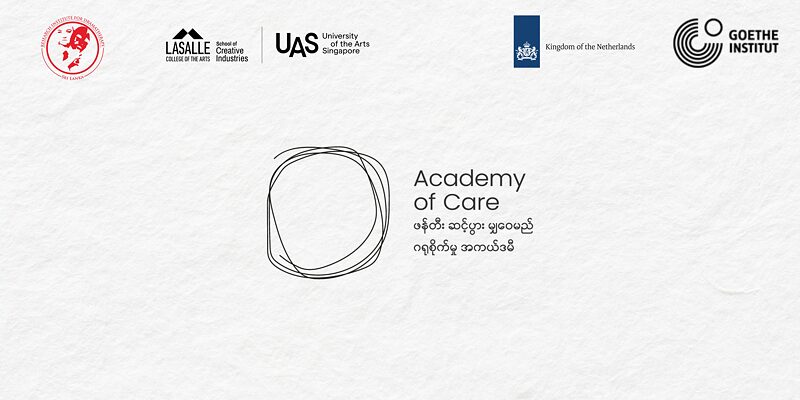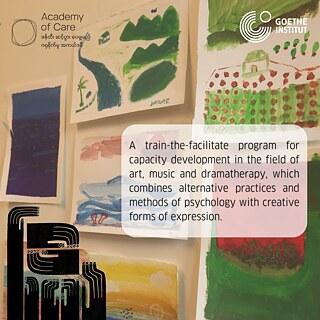The AoC Cohort 3 program progresses through following stages:
1. Initial Seminar:
The program begins with a 3-day seminar that introduces key concepts in mental health awareness and trauma-informed care. This foundational stage equips participants with the essential knowledge needed for the following phases of the program.
2. Creative Expressive Therapeutic Intervention and Facilitation Workshops:
Over the next four weeks, international therapists and experienced trainers guide participants through intensive, hands-on training in Dramatherapy, Art Therapy, and Music Therapy. These workshops, each lasting two weeks, combine interactive seminars, practical exercises, and peer-supervised practice sessions. Participants have the opportunity to choose a specialization in either Art Therapy or Music Therapy, while all participants will receive comprehensive training in Dramatherapy.
3. Proposal Development Training:
During this phase, participants focus on developing proposals for community-based projects. With guidance from mentors, they begin to design pilot projects using one or more of the creative therapy techniques they have learned. These proposals aim to bring mental health support and creative therapies to local communities upon completion of the program.
4. Practice-Based Week with Peer Supervision:
In the final stage, participants put their skills into practice by facilitating creative therapy sessions within their groups. This practice-based week, guided by peer supervision, allows participants to refine their facilitation techniques and receive feedback in a supportive learning environment.
Seed Funding
AoC’s seed funding program provides financial and mentorship support to participants, enabling them to implement their own community-based initiatives. These projects are designed to extend the impact of the AoC training by applying creative therapeutic techniques learned during the program, such as art, music, and drama therapies, to address mental health challenges within local contexts.
The seed-funded projects aim to create a lasting ripple effect by promoting mental well-being and awareness through workshops, educational campaigns, and hands-on therapeutic activities in underserved or vulnerable communities. Participants are encouraged to tailor their initiatives to the specific needs of their regions, ensuring that the creative approaches are culturally relevant and accessible.
In addition to financial backing, recipients of the seed funding receive ongoing mentorship from AoC trainers and peers, helping them refine their projects, overcome challenges, and maximize their impact. By supporting these projects, the seed funding program not only empowers participants to lead change but also helps cultivate sustainable mental health initiatives that continue long after the program concludes.
Highlights from Cohort 2 (May - July 2024):
Cohort 2 participants underwent intensive training led by eight experienced psychiatrists and international therapists specializing in creative therapies. Experts from Singapore (Lasalle College of the Arts), Germany (University of Music and Drama Hamburg), Israel, Pakistan, Sri Lanka (Research Institute for Dramatherapy), and Myanmar offered diverse perspectives on creative therapy practices, enriching the participants' learning experience.
The 13 participants, who received full scholarships, came from diverse regions across Myanmar, including Myitkyina (Kachin), Hpa-An (Kayin), Loikaw (Kayah), Taunggyi (South Shan), Lashio (Northern Shan), Kyein Tone (Northern Shan), Maungdaw (Rakhine), Gwa (Rakhine), Hlegu, Kawt Hmu (Yangon), and Hakha (Chin). Representing a variety of professional backgrounds—such as educators, early childhood educators, youth leaders, lawyers, counselors, artists, community leaders, and nurses—they established a strong network. Through this connection, they gained a deeper understanding of the unique challenges faced in different regions and are committed to supporting one another.
After the first 6 weeks of training with local and international experts, participants engaged in hands-on workshops and practice-based sessions, deepening their understanding of creative therapies and preparing to apply these approaches within their communities.
The group participated in a practice-based week, where they applied the knowledge gained during the training. They first practiced internally with each other to digest their learning before hosting an Open House event at the Goethe-Institut Myanmar. During the event, they facilitated workshops in group settings, sharing their learning journey with external guests.
Before returning to their hometowns, participants received proposal writing training to help them apply for seed funding grants to launch their own community-based initiatives. These initiatives aim to spread mental health awareness and promote mental well-being and healing through creative therapy approaches within their communities.
Five participants, representing four projects, were successfully selected for grant funding through a pitching and selection process conducted by the program jury team. The selected projects will focus on supporting both youth, elderly and primary caregivers from the Chin, Shan, Yangon, and Bago regions. The grant recipients will implement their 3.5-month projects, with final reports expected by December 2024.
This hands-on experience and project support will enable participants to continue promoting mental health awareness and facilitating healing through creative therapies in their respective communities.
Cohort 3 Program Highlight: World Mental Health Day, October 10-12, 2024:
During this week, AoC will collaborate with international therapists for public talks and intervention activities. Participants from Cohort 3 will gain hands-on experience and engage with the public, alongside AoC alumni, to promote mental well-being.
World Mental Health Days (WMHD) 2024: Mindful October – Creative Paths to Mental Wellbeing and Healing
In honor of World Mental Health Days (WMHD) 2024, we proudly present Mindful October: Creative Paths to Mental Wellbeing and Healing, a three-day event focused on promoting mental well-being through creative and cultural activities. From October 10 to 12, 2024, join us at Goethe-Institut Myanmar for a meaningful experience that fosters resilience, emotional healing, and personal growth, particularly for Myanmar’s youth and broader communities.
This event is co-hosted by Academy of Care (AoC), Goethe-Institut Myanmar, British Council, European Union, Institut Français de Birmanie, and our local partners. Together, we aim to address mental health challenges by harnessing the power of creative expression, with a special focus on trauma recovery.
Event Highlights:
Throughout these three days, participants will have the opportunity to engage in:
- Workshops on art therapy, music therapy, and drama therapy, led by both local and international experts.
- Theatre performances and poetry readings with music performance that explore themes of emotional well-being and mental health.
- Short film screenings and youth dialogues to encourage open discussions about mental well-being and emotional resilience.
- These interactive activities are designed to help participants explore mental health through creative avenues, building coping skills, managing stress, and expressing emotions in a supportive, nurturing environment.
Partners:
This event is a collaboration between Goethe-Institut Myanmar, the Academy of Care, British Council, European Union, Institut Français de Birmanie, and local partners.

